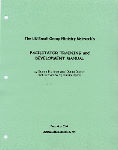We used the topic of Facilitator Burnout at our January facilitator meeting (In addition, some of our facilitators submitted answers for the January issues of CG News.). Here are some of the factors they named as making a difference, along with my ideas:
- Co-facilitators are a great way to reduce burn-out. They share energy, capitalize on one another's strengths, and support one another in the work of the group. They never feel alone.
- Sharing responsibility with group members. Whether it's bringing snacks, hosting meetings, offering opening and closing words, or planning entire sessions, shared leadership helps groups do their best. Several of our groups include in their covenant or ground rules how they will assign various responsibilities within the group. The facilitator does not need to be responsible for everything.
- We allow leadership to change. If someone wants to let go of the facilitator role, the first place we look for a new facilitator is within the group. Often, someone will step forward, especially if it can be a shared responsibility as described in #1 and #2. At least one of our groups used to change leadership every year. Many of them have experienced leadership transitions. This can enliven a group.
- Facilitators who attend the every other month meetings with the minister find it a strong support. Hearing other people's ideas and challenges invigorates them and helps them to realize how much they know.
- Finally, when it's time for a group to die, we let it die. A facilitator does not need to keep beating a dead horse. If people aren't showing up, aren't enthusiastic, can't keep going, then it's time to find a way to celebrate the group for what it has been and let it stop meeting. This is possible because each year we make an effort to start new groups. We talk about the natural lifecycle of a group, and don't try to force them to be something they aren't.
Those are the hints our facilitators and I came up with. Hope it helps!











